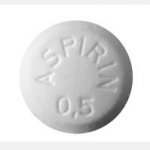 In today s just when you think you understand stuff news, the FDA dropped a bomb on Bayer and released an advisory that is certain to confuse the millions of people who have been religiously taking aspirin to ward off heart disease and strokes.
In today s just when you think you understand stuff news, the FDA dropped a bomb on Bayer and released an advisory that is certain to confuse the millions of people who have been religiously taking aspirin to ward off heart disease and strokes.
Their advisory, which is based on an analysis of multiple major studies, concludes that there is not adequate evidence to support the use of aspirin for primary prevention meaning using some therapy to prevent a cardiovascular event among people who have no prior history of any such ailment. The agency's advisory did not change its recommendation for secondary prevention the use of aspirin to prevent additional cardiovascular events in patients who have already had a stroke or heart attack.
ACSH s Dr. Josh Bloom explains, All drugs have some side effects. With aspirin, these include gastric irritation, ulcers, and bleeding. When these are compared to the benefits to people who already have heart disease, the risk becomes acceptable. But when there is no demonstrated benefit as the FDA has concluded then the benefit to risk ratio is unknown. And possibly zero.
This is certain to cause much confusion, since it has long been dogma that preventive aspirin treatment is likely beneficial even for healthy people.
But, as Dr. Bloom explains, Science and medicine are not static. Old and accepted theories can evaporate very quickly. The recent news that saturated fats do not contribute to heart disease is a perfect example of this. Other examples that challenged medical dogma include annual checkups and routine mammography not saving lives, and daily vitamin consumption not only has no benefits, but may even be risky. It must be frustrating to people not knowing what to believe, but this is how progress is made.
ACSH s Dr. Gil Ross has a problem with the FDA advisory it seems to pass the buck from the FDA s review to the primary care doctor, something of a cop-out. It implies that doctors may have some special insight that would prompt them to override the FDA advisory. Of course, a patient s own primary care doctor might possibly have insights into whether an individual patient might qualify for aspirin prophylaxis who does not conform to the FDA guidelines. In general, both doctors and patients should give careful consideration to these recommendations. It seems to me that the risk of bleeding, for instance, is widely underestimated, since the thought of a heart attack or stroke is much more concerning, in general.


